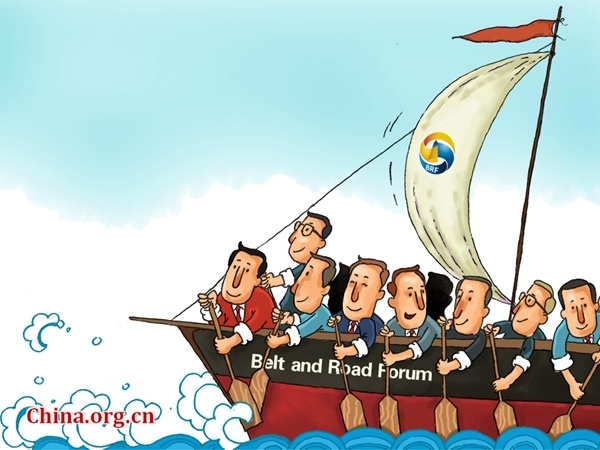Belt and Road Initiative – A boon for the Middle East
- By Rabi Sankar Bosu
 0 Comment(s)
0 Comment(s) Print
Print E-mail China.org.cn, May 4, 2017
E-mail China.org.cn, May 4, 2017
|
|
|
The Belt and Road Forum (BRF) for International Cooperation is scheduled to be host on May 14-15 in Beijing. [Zhai Haijun/China.org.cn] |
Surely this historic speech is the genesis of President Xi Jinping's signature global economic vision, the Belt and Road (B&R) Initiative, which consists of the Silk Road Economic Belt and the 21st Century Maritime Silk Road, aiming at building a trade and infrastructure network connecting Asia with Europe and Africa even beyond the ancient Silk Road trade routes.
Since 2013, it has offered a solution to many issues in the Middle East involving development through investment, transfer of technology, industry and trade. In fact, the Belt and Road Initiative and the Asia Infrastructure Investment Bank (AIIB) provide new opportunities for Middle East countries.
The Middle East has always had a unique and important place in China's foreign policy since the PRC was founded in 1949, creating a reliable China-Arab strategic cooperative relationship based on long-term friendship.
President Xi has called for a joint endeavor to build the Belt and Road so as to make international relations more democratic, respecting national sovereignty and non-interference in internal affairs of any nation. Surely, this is cementing cooperation with the Middle East with Chinese investment powered by the AIIB.
China is now the top trading partner of 10 Arab countries involving more than US$200 billion. Nearly half of its crude oil imports come from Arab countries, while its investment in the region is rising fast. The Chinese economic presence can be clearly seen in the massive energy market of Saudi Arabia, the infrastructure developments in Iran, and the domination of trade with Lebanon.
In terms of strategic location, Saudi Arabia serves as the central hub connecting three continents – Asia, Africa and Europe – and has been an important part of the Belt and Road Initiative. In 2015, China became Saudi Arabia's largest trade partner and, in reverse, the latter has been China's biggest crude oil supplier and largest trade partner in West Asia and Africa for years.
Xi's visit to Saudi Arabia last year shored up China's sphere of influence in the Middle East. Saudi Arabian King Salman's three-day visit to China in March this year showed the importance he attached to the relationship. It is expected that the Belt and Road Initiative will make creative contributions to helping Saudi Arabia realize its "Saudi Vision 2030" plan.
Iran also warmly welcomes the Initiative as a revival of the ancient Silk Road east-west trading route. China has given much help during the hard times of Iran's development. President Xi called for better cooperation and closer ties with Iran under the "Belt and Road" framework. In January last year, his visit to Iran appears to have energized Iran's integration in the Eurasian fold.
The first train from China's trading hub of Yiwu arrived in Tehran on February 16, 2016 signaling Iran's firm integration into B&R connectivity. Iran will also play a crucial role through its southeastern port city of Chabahar becoming a crucial juncture linking land routes to shipping lanes.
For years, China has showed the world that it is committed to peace and development in the Middle East. China is a firm supporter and sincere mediator for peace between Israel and Palestine.
Speaking to the Arab League in Cairo on January 21, 2016, President Xi referred to the injustice long endured by the Palestinian people and announced 50 million yuan ($7.6 million) in immediate aid.
China is also involved in building infrastructure in Israel, such as digging the Carmel tunnels in Haifa, laying a light rail network in Tel Aviv, and expanding the Ashdod and Haifa seaports.
The B&R Initiative has promoted political stability mainly in Central Asia and the Middle East. According to Gong Xiaosheng, China's special envoy on Middle East affairs, "The Belt and Road Initiative is highly likely to become China's most significant contribution to the Middle East peace process because it will provide the economic solution the region needs."
China's non-interference policy regarding Middle East issues has been appreciated and acknowledged by Egypt, Lebanon, Turkey, United Arab Emirates and other Middle East countries because it promotes practical cooperation with China through economic and trade cooperation.
The B&R Initiative could lead Middle East countries down a road of hope, stabilization and development. It is hoped that the Belt and Road Forum (BRF) for International Cooperation from May 14 to 15 in Beijing will be a golden platform for Middle East countries to understand the Chinese way of thinking that offers common development and harmonious rejuvenation between civilizations.
Rabi Sankar Bosu, Secretary of New Horizon Radio Listeners' Club, West Bengal, India
Opinion articles reflect the views of their authors only, not necessarily those of China.org.cn.







Go to Forum >>0 Comment(s)